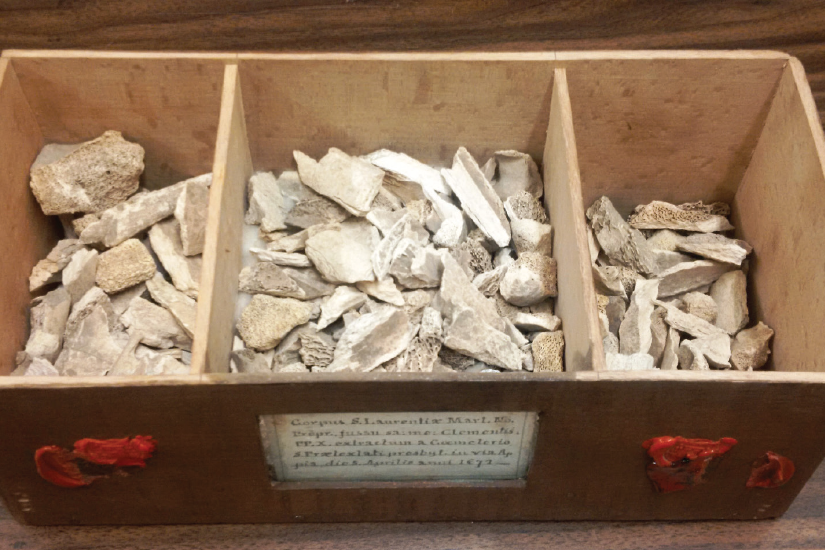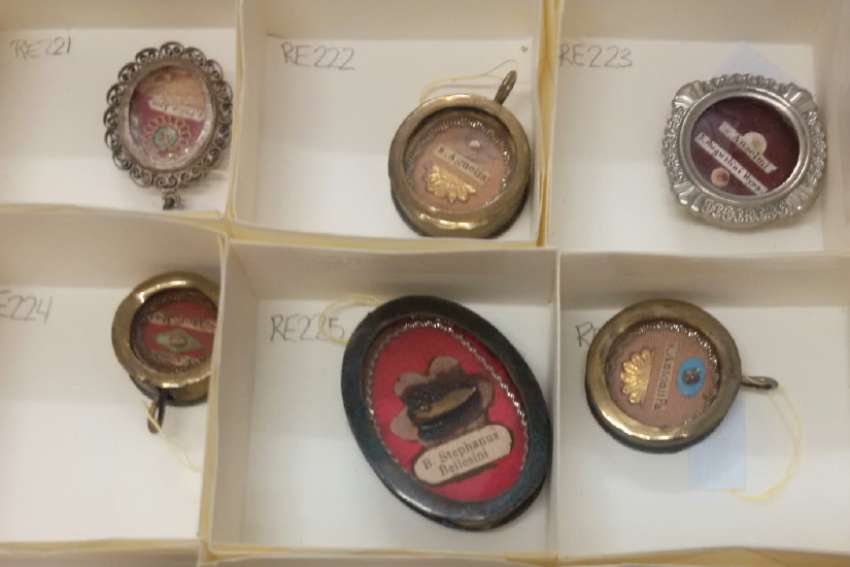For the past few weeks, the diocesan office has been fielding hundreds of calls and e-mails after an online article caught the world’s attention.
On April 9, the Catholic organization Aleteia.org published a story under the headline, “More than 250 relics of Catholic saints are being given away in Canada.” The article was based on a CBC news report April 2 that profiled a growing collection of relics in the London diocese as a result of parish amalgamations in the past decade.
“It started out with a curious reporter from the (CBC) Windsor office that wanted to learn more about relics,” said diocesan archivist Debra Majer. “So (Aletia.org) caught the story and what they did was they flipped the headline.”
On the morning the online article was released, Majer awoke to dozens of e-mails in her inbox. By mid-morning, the phone lines went down. Hundreds of e-mail requests flooded the office inboxes.
“It just shook the world up,” said Majer. “These requests were coming from the Archdiocese of Perth, Singapore, India, the Philippines, God knows how many times, everywhere throughout Europe, the UK…. They even found me on my LinkedIn profile.”
Among requests she was able to read, Majer found some incredible stories. More than one individual offered to fly overseas to pick up their very own saint relic.
 A box of bones from St. Laurentia. (Photo courtesy of Diocese of London)
A box of bones from St. Laurentia. (Photo courtesy of Diocese of London)
She received requests from collectors who wanted new additions to the hundreds of saints they have in their own collection.
A Catholic news agency from Germany offered to take custody of the entire collection to distribute the relics on London’s behalf.
Among the requests, Majer said there were beautiful stories from people around the world.
“One instance was of this young woman that said her one-year anniversary was coming up with her husband and they found out they weren’t able to have children,” Majer said. “And she was just devastated by it and this article seemed to give her something to all of a sudden look forward to. There was something quite honest and beautiful about her request.”
If “relicmania” taught Majer anything, she said it is that the veneration of relics and the lives of the saints are still essential devotions for Catholics around the world. These holy items aren’t just pieces of history. They are part of our everyday lives as Catholics.
Majer and the communications office at the Diocese of London quickly realized that that they had to “put the genie back in the bottle.” The diocese released a statement the next day.
“We are delighted that readers around the world have been excited by the stories concerning the relics contained in our archive,” the statement read. “Unfortunately, many readers have been inadvertently given the wrong impression. Please note that the diocese is not liquidating its collection of relics. Unfortunately, we are having to decline requests for relics, requests in which in 24 hours already outpaced the number of relics we were able to share.”
Majer had to set up an “out of office” auto reply that said no more relics were being given away at the time.
In her 15 years working at the Diocese of London, Majer had never seen such “complete and utter bombardment” of messages and neither has anyone else in the chancery office.
“Nobody in the office was grumpy about it,” she said. “The bishop (Ronald Fabbro) laughed. We showed him the original article and then the viral article and he was like, ‘What?!’ And it was really quite funny and everyone was laughing about it.”
Majer said her original intention with the story was to make sure that these holy items didn’t just sit on a shelf in the archive room. Relics of saints are meant for devotion. They are physical and tangible signs of God’s work in His creation, she said.
“The original idea of this article was if there’s a pastoral minister in a parish community who needs a relic, I will offer them where they need to go,” she said.
To date, Majer has given away 15 relics to parish pastors, lay ministers, seminarians and even private individuals.
Majer has two rules for sharing the relics: They must remain within the diocese and they must be used for community life and devotion.
“The reason why I wasn’t completely narrow in describing who I’d give them to is because I never though anyone outside southwestern Ontario would be interested,” she said. “I want to still take these requests on a case-by-case basis and we’re just going to continue to support the parish communities and those interested in our diocese.”


